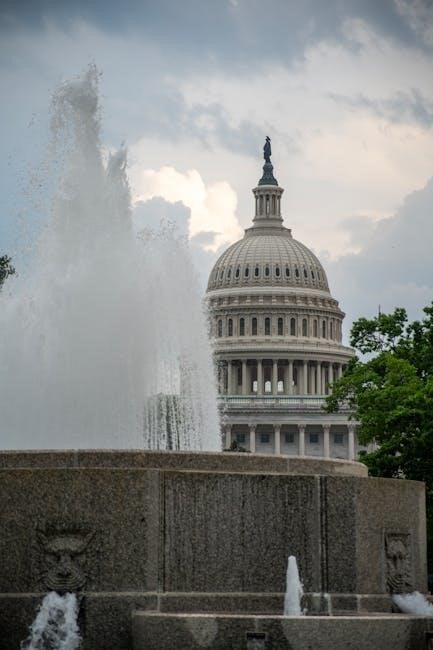American democracy in 2025 faces significant scrutiny amid polarization, racial injustice, and economic inequality. Experts warn of declining democratic health, emphasizing the need for urgent reforms to safeguard democratic principles and ensure equitable governance.
Overview of the Current State of American Democracy
American democracy in 2025 faces significant challenges, including polarization, racial injustice, and economic inequality. The Economist Intelligence Unit’s Democracy Index categorizes the U.S. as a “flawed democracy,” highlighting shortcomings in government functioning and political culture. Voting rights remain a critical issue, with landmark legislation like the Voting Rights Act of 1965 still vital for ensuring equitable access. Disinformation, executive overreach, and attacks on election integrity further strain democratic institutions. Despite these challenges, the U.S. retains foundational democratic principles, but concerns about democratic erosion persist, with many Americans expressing anxiety about the future of governance and representation.
Importance of Understanding Democracy in Modern America
Understanding democracy in modern America is crucial for addressing its challenges and ensuring its resilience. Recognizing the interconnected threats of polarization, racial injustice, and economic inequality helps identify solutions. Voting rights, a cornerstone of democracy, empower citizens to influence governance. Landmark legislation like the Voting Rights Act of 1965 remains vital for protecting marginalized groups. By acknowledging these issues, Americans can work toward reforms that strengthen democratic institutions and uphold the principles of equality and justice, fostering a system that truly represents the will of the people and secures a stable future for democracy.

Threats to American Democracy
American democracy faces interconnected threats, including toxic polarization, racial injustice, economic inequality, executive overreach, and disinformation, all eroding trust and stability in democratic institutions and processes.
Polarization and Its Impact on Democratic Institutions
America faces deepening polarization, with partisan divides intensifying political gridlock and eroding trust in democratic institutions. This toxic polarization, fueled by media fragmentation and social divides, undermines collaboration and governance. Experts warn it exacerbates racial and economic inequalities, weakening democratic stability. Persistent polarization risks democratic erosion, threatening the foundation of American democracy and its ability to address critical challenges effectively. Addressing this divide is crucial to restoring democratic health and ensuring equitable governance for all citizens.
Racial Injustice and Its Role in Democratic Erosion
Racial injustice remains a critical threat to American democracy, perpetuating systemic inequality and undermining democratic principles. Historical and ongoing discrimination continues to marginalize communities of color, limiting their political power and representation. This disparity is evident in voter suppression tactics, unequal access to resources, and biased institutions. The legacy of segregation and discrimination has created deep divides, exacerbating polarization and eroding trust in democratic systems. Addressing racial injustice is essential to restoring fairness and ensuring equitable participation in governance, which is vital for the health and resilience of American democracy.
Economic Inequality and Its Strain on Democratic Systems
Economic inequality significantly strains American democratic systems by creating disparities in political influence and opportunity. The concentration of wealth among the elite limits access to resources for marginalized groups, undermining equal representation. This imbalance fosters a system where policies often favor the affluent, perpetuating cycles of poverty and social inequality. The erosion of the middle class and rising debt levels further exacerbate these challenges, threatening the stability of democratic governance and public trust in institutions. Addressing economic inequality is crucial to ensuring a fair and representative democracy.
Executive Overreach and Its Consequences
Executive overreach has emerged as a significant concern in American democracy, with growing fears about the expansion of presidential power. Historically, such overreach has recurred, but its modern implications are particularly alarming. Recent concerns include the manipulation of federal agencies for political gain and unilateral decision-making that bypasses legislative checks. This erosion of constitutional balances undermines democratic accountability and the rule of law. Experts warn that unchecked executive power risks destabilizing governance and eroding public trust. Addressing this issue requires robust oversight and adherence to constitutional limits to prevent further damage to democratic institutions and processes.
Disinformation and Its Threat to Democratic Governance

Disinformation has become a critical threat to American democracy, undermining public trust and distorting decision-making. The spread of false narratives through social media and partisan outlets has intensified political polarization, eroding faith in democratic institutions. Experts warn that this misinformation crisis compromises the integrity of elections and governance. Efforts to combat disinformation require robust media literacy, fact-checking initiatives, and regulatory reforms to ensure the accuracy and reliability of information. Addressing this challenge is essential to preserving democratic governance and fostering an informed citizenry capable of participating meaningfully in the democratic process.

Foundations of American Democracy
American democracy is rooted in the Constitution, the longest-surviving written charter of government, and key amendments ensuring representation, equality, and the rule of law.
Historical Context of American Democratic Development
The United States established the world’s oldest modern democracy with its 1789 Constitution, setting foundational principles of representation and rule of law. Over centuries, landmark legislation like the Voting Rights Act of 1965 expanded democratic access, addressing racial discrimination and empowering marginalized groups. Despite progress, challenges persist, including polarization and inequality, which threaten democratic stability. The evolution of American democracy reflects a continuous struggle to balance power and ensure equitable governance, shaping its current state as a flawed yet resilient system.
Key Legislation Supporting Democratic Principles
Landmark legislation such as the Voting Rights Act of 1965 and the Civil Rights Act of 1964 has been instrumental in upholding democratic principles in the United States. These laws dismantled racial barriers to voting and ensured equal protection under the law, fostering greater inclusivity in the democratic process. Additionally, the 14th Amendment, guaranteeing citizenship and equal rights, laid a constitutional foundation for modern democratic ideals. These legal frameworks have been pivotal in advancing American democracy, though ongoing challenges highlight the need for continued vigilance and reform to protect these principles.

Comparative Analysis with Other Democracies
Global rankings highlight the U.S. as a flawed democracy, with shortcomings in governance and political culture compared to other advanced democracies worldwide.
Global Rankings of American Democracy
The United States is categorized as a “flawed democracy” in the Economist Intelligence Unit’s Democracy Index for 2023, with scores reflecting shortcomings in governance and political culture. Global rankings indicate a decline in America’s democratic health, dropping from 0.85 in 2015 to 0.77 in 2023. The Freedom in the World index also shows an 11-point decline over 13 years, placing the U.S. behind other advanced democracies. While the U.S. remains a high-functioning democracy, these rankings highlight challenges like polarization, racial injustice, and economic inequality that strain its democratic systems and global reputation.
Lessons from International Democratic Systems

International democratic systems offer valuable insights for strengthening American democracy. Countries like Germany and Sweden exemplify robust federal structures and transparent governance, which enhance accountability. The Nordic model highlights the importance of civic engagement and equitable representation. Meanwhile, nations like New Zealand demonstrate effective electoral reforms, such as proportional representation, to reduce polarization. These global examples underscore the need for the U.S. to adopt practices that foster inclusivity, reduce inequality, and ensure fair representation. By learning from these systems, America can address its democratic challenges and build a more resilient framework for governance and civic participation.

Role of State and Local Governance
State and local governments play a crucial role in safeguarding democratic values, balancing federal power, and implementing policies that directly impact communities, ensuring fair representation and accountability.

State Legislatures and Democratic Values
State legislatures are pivotal in upholding democratic values, as they shape laws and policies that directly impact citizens’ lives. Their decisions influence voting rights, education, and public health, often reflecting broader national debates. In 2025, state legislatures face heightened scrutiny, with many viewed as either defenders or detractors of democracy. A 2024 Georgetown poll revealed that 53% of Americans trust state officials more than federal ones to address democratic challenges. However, concerns persist about partisan gerrymandering and legislation that may undermine democratic norms. The balance of power at the state level remains critical to the health of American democracy.
Local Governance and Its Impact on National Democracy
Local governance plays a crucial role in shaping national democracy, as it directly impacts citizens’ daily lives and trust in institutions. Municipal policies on education, public safety, and infrastructure set the foundation for broader democratic engagement. Yet, challenges such as partisan influence and resource disparities can undermine local democratic processes. According to a 2024 survey, 76% of Americans believe local leaders are more responsive to their needs. However, issues like voter suppression and mismanagement of funds threaten to erode this trust, highlighting the need for transparency and accountability to ensure local governance strengthens, rather than weakens, national democracy.

Path Forward for Defending Democracy
Rebuilding trust, fostering civic engagement, and implementing systemic reforms are essential to revitalize American democracy. Public participation, transparency, and bipartisan cooperation must be prioritized to address ongoing challenges and ensure a resilient future for democratic governance.
Public Engagement and Civic Responsibility
Public engagement and civic responsibility are cornerstone principles in sustaining American democracy. Active participation in elections, advocacy, and community affairs fosters a sense of ownership and accountability. Education and awareness campaigns play a critical role in empowering citizens to make informed decisions. By encouraging dialogue and collaboration, individuals can bridge divides and address systemic issues. Civic responsibility also involves holding leaders accountable and upholding democratic norms. Collective action strengthens institutions and ensures that governance reflects the will of the people, paving the way for a more equitable and resilient democratic future.
Reforms to Strengthen Democratic Institutions
Reforms are essential to fortify American democratic institutions against erosion. Campaign finance reform can reduce the influence of money in politics, while expanding voting access ensures broader participation. Strengthening checks and balances prevents overreach, and independent redistricting commissions can eliminate gerrymandering. Enhancing transparency in governance and media literacy combats disinformation. Anti-corruption measures and judicial reforms further uphold accountability. These steps aim to restore trust, ensure fairness, and safeguard democratic principles for future generations, fostering a system that reflects the will of the people and withstands contemporary challenges.
American democracy stands at a crossroads, facing significant challenges yet showing resilience. The path forward requires collective action and a commitment to democratic values to ensure a stable future.
Final Thoughts on the Future of American Democracy
American democracy faces critical challenges, including polarization, racial injustice, and economic inequality, which threaten its stability. Addressing these issues requires comprehensive reforms and public engagement. The resilience of democratic institutions depends on fostering trust and ensuring equitable representation. Citizens must remain vigilant, advocating for transparency and accountability in governance. The path forward involves balancing tradition with innovation to meet modern demands. By learning from history and embracing collective responsibility, Americans can safeguard their democracy, ensuring it remains a beacon of freedom and justice for generations to come;